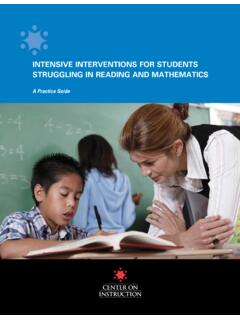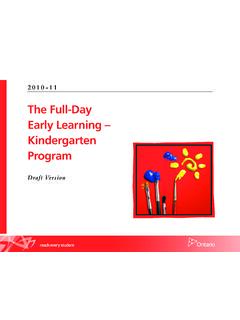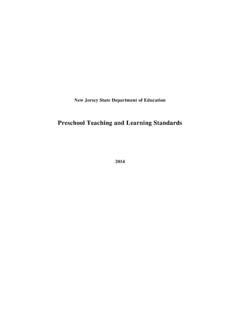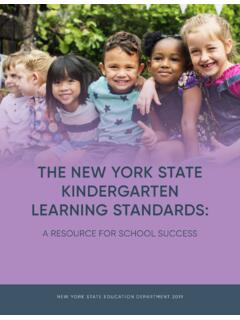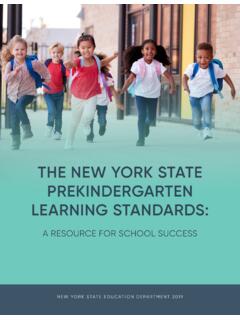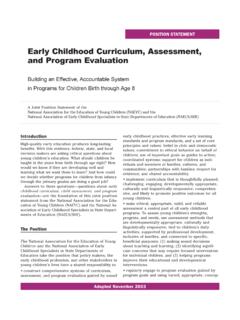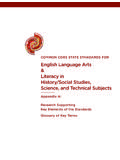Transcription of Tapasā - Teaching Council
1 TAPAS | CULTURAL COMPETENCIES FRAMEWORK FOR TEACHERS OF PACIFIC Cultural competencies framework for teachers of Pacific learnersPublished 2018 by the Ministry of Education, New Zealand Te T huhu o te M taurangaM tauranga House, 33 Bowen Street PO Box 1666, Thorndon Wellington 6140, New copyright 2018 ISBN: 978-1-77669-360-3 (Print)ISBN: 978-1-77669-361-0 (Online)Replacement copies may be ordered from Ministry of Education Customer Services: Please quote item number 69360 Online at Email Freephone 0800 660 662 Freefax 0800 660 663 TAPAS | CULTURAL COMPETENCIES FRAMEWORK FOR TEACHERS OF PACIFIC The Government will champion a high-quality inclusive education system that provides all New Zealanders with learning opportunities to lead rewarding and fulfilling lives.
2 From early childhood education through to tertiary level, helping our children to learn in a curious and confident manner is crucial to ensure that they are resilient and adaptable to changes. The Standards for the Teaching Profession that were published in 2017 set new expectations for teachers. They describe what high-quality Teaching practice looks like, and set an expectation that teachers design learning based on an understanding of each learner s strengths, interests, needs, identities, languages and cultures.
3 This is a significant lift in expectation, and the standards combined with the Tapas framework will be important resources that support all teachers of Pacific New Zealand education system is world leading, and many learners do very well and achieve outstanding success. However, the system can do more to ensure excellent and equitable outcomes for all learners because we know there are challenges within the system for some, and Pacific learners constitute a significant proportion. Pacific peoples are one of the larger ethnic groups in New Zealand, with the highest proportion of children aged 0-14 years.
4 It is estimated that the number of Pacific learners will increase from 10 to 20 percent of the total school population by 2050 (Pasifika Education Monitoring Report. Ministry of Education. 2017). The Tapas Cultural Competency Framework is a tool that can be used to build the capability of all teachers of Pacific learners across all education sectors. It is aligned with the Code of Professional Responsibility and Standards for the Teaching profession, and is a valuable resource to increase awareness and strengthen cultural competence in Teaching practice through the appraisal process.
5 The tool has been developed in collaboration with key Pacific community stakeholders who have participated in a series of talanoa workshops with education practitioners and the Ministry of Education. Tapas is designed to primarily support non-Pacific leaders, teachers and boards to engage with Pacific learners in culturally responsive ways. Tapas is the first step in an ongoing development journey to better understand the identity, language and culture of Pacific people, to connect, collaborate, and co-construct Teaching and learning with Pacific children, young people, their parents, families and communities.
6 I encourage all leaders and teachers to use this tool alongside other resources to enable every Pacific learner to achieve their full potential and be is my sincere hope that Tapas assists you in your work to create positive, respectful and meaningful relationships to ensure our Pacific learners feel empowered and engaged. This is an exciting piece of work and I look forward to our continued journey in improving quality learning outcomes for our apa apa atuHon Jenny Salesa ASSOCIATE MINISTER OF EDUCATIONTAPAS | CULTURAL COMPETENCIES FRAMEWORK FOR TEACHERS OF PACIFIC.
7 1 Introduction ..3 Pasifika Success ..4 The Pasifika Success Compass ..4 The term Pasifika ..5 The term Pacific ..5 The meaning of Tapas within this framework ..5 Working with Tapas ..6 Assumptions ..6 Knowing yourself ..7 Characteristics of a good teacher ..7Ng Turu - The Competencies ..8 Turu 1: Identities, languages and cultures ..8 Turu 2: Collaborative and respectful relationships and professional behaviours ..8 Turu 3: Effective pedagogies for Pasifika learners ..9 The Framework.
8 9 Clarification of framework ..9 Headings ..9 Tapas framework ..10 Scenarios/Case Studies ..16 A case study analysis flow chart ..16 Guiding questions ..22 Useful links ..23 Websites ..24 Pedagogical Models and Frameworks ..26 Pacific Research Models and Frameworks ..27 Bibliography ..28 Glossary ..33 TAPAS | CULTURAL COMPETENCIES FRAMEWORK FOR TEACHERS OF PACIFIC Pacific parents, families and communities value education. Education is part of their narrative for migrating to New Zealand, the country they have chosen to establish their families and communities, and educate their children and the generations to come.
9 Driven by their aspirations they want their children to reach their full potential. New Zealand s world class education system needs to deliver equitable outcomes for all learners, including Pacific learners. Research shows that quality Teaching can make the biggest difference in learner educational achievement. The research also tells us that parents and families play a critical role in the success of their children within early learning settings and in schools. 1 For Tapas , quality Teaching is described in the works of Alton-Lee (2003) and Farquhar (2003).
10 The Pasifika Education Plan (PEP) sets out the Government s strategy for Pasifika Success where Pasifika learners enjoy educational success as Pasifika. They are secure in their identities, languages and cultures, and participating, engaging and achieving in education, contributing fully to Aotearoa, New Zealand s social, cultural and economic wellbeing. Building Pasifika cultural competencies across the education workforce is one of the PEP s key targets. Skilled and confident teachers (and leaders) are important for Pasifika educational success.






